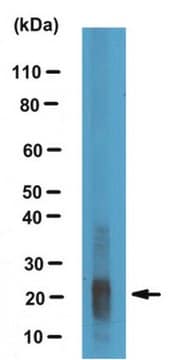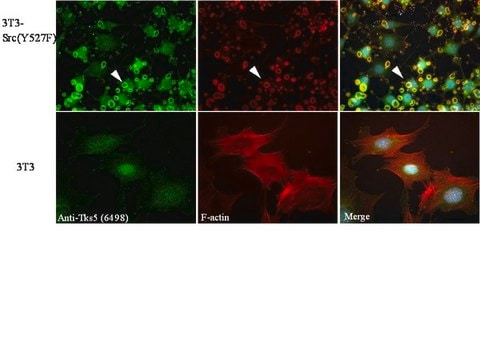Recommended Products
biological source
rabbit
Quality Level
antibody form
purified antibody
antibody product type
primary antibodies
clone
polyclonal
species reactivity
human
manufacturer/tradename
Upstate®
technique(s)
western blot: suitable
isotype
IgG
NCBI accession no.
UniProt accession no.
shipped in
dry ice
target post-translational modification
unmodified
Gene Information
human ... ISG15(9636)
General description
ISG15 (also called ubiquitin cross-reactive protein (UCRP) due to its cross-reactivity with ubiquitin antibodies) was originally identified as an interferon stimulated gene (ISG) whose expression is highly induced upon interferon treatment. ISG15 contains two ubiquitin homology domains in tandem and shows ~30% identity to ubiquitin. Unlike ubiquitin, that is almost 100% homologous across species, ISG15 is only conserved in dispersed regions. Homology among the five identified mammalian ISG15 proteins is only about 47%. Like other Ubls, ISG15 is synthesized as a 17-kDa precursor form and processed to 15- kDa protein by a specific protease in order to expose di-glycine residues at the carboxyl terminal which is critical for subsequent conjugation to target proteins.
Specificity
Antibody 09-412 recognizes several members of the ubiquitin-like (Ubl) family including ubiquitin, SUMO-1, SUMO-2, SUMO-3, Nedd8, FAT10, Ubl5, Urm1 and Fub1. This antibody shows no cross-reactivity with any of these Ubls in recombinant form upon Western blotting under the conditions used.
Immunogen
Peptide corresponding to residues 85-101 of human ISG15.
Application
Detect ISG15/UCRP using this Anti-ISG15/UCRP Antibody validated for use in WB.
Research Category
Protein Trafficking
Protein Trafficking
Research Sub Category
Ubiquitin & Ubiquitin Metabolism
Ubiquitin & Ubiquitin Metabolism
Target description
18 kDa
Physical form
100 µL of purified by salt precipitation and peptide immunochromatography in PBS containing 0.01 M sodium azide. Dilute to working strength with phosphate buffered saline pH 7.2-7.4 and 1% normal goat serum (if a goat anti-rabbit IgG linker antibody is to be used).
Format: Purified
Salt precipitation
Storage and Stability
Stable for 1 year at -20°C from date of shipment for up to 12 months.
Legal Information
UPSTATE is a registered trademark of Merck KGaA, Darmstadt, Germany
Disclaimer
Unless otherwise stated in our catalog or other company documentation accompanying the product(s), our products are intended for research use only and are not to be used for any other purpose, which includes but is not limited to, unauthorized commercial uses, in vitro diagnostic uses, ex vivo or in vivo therapeutic uses or any type of consumption or application to humans or animals.
Not finding the right product?
Try our Product Selector Tool.
Storage Class Code
10 - Combustible liquids
WGK
WGK 2
Flash Point(F)
Not applicable
Flash Point(C)
Not applicable
Certificates of Analysis (COA)
Search for Certificates of Analysis (COA) by entering the products Lot/Batch Number. Lot and Batch Numbers can be found on a product’s label following the words ‘Lot’ or ‘Batch’.
Already Own This Product?
Find documentation for the products that you have recently purchased in the Document Library.
C E Samuel
Clinical microbiology reviews, 14(4), 778-809 (2001-10-05)
Tremendous progress has been made in understanding the molecular basis of the antiviral actions of interferons (IFNs), as well as strategies evolved by viruses to antagonize the actions of IFNs. Furthermore, advances made while elucidating the IFN system have contributed
Lin Sang et al.
Pharmacology, 101(5-6), 322-329 (2018-04-06)
Cervical cancer (CC) is one of the most common gynecological malignancies, and metastasis limits the use of surgical resection. Metapristone (MIF) was reported to suppress the proliferation and migration of several cancer cells. Exosomes play a variety of roles in
Our team of scientists has experience in all areas of research including Life Science, Material Science, Chemical Synthesis, Chromatography, Analytical and many others.
Contact Technical Service








